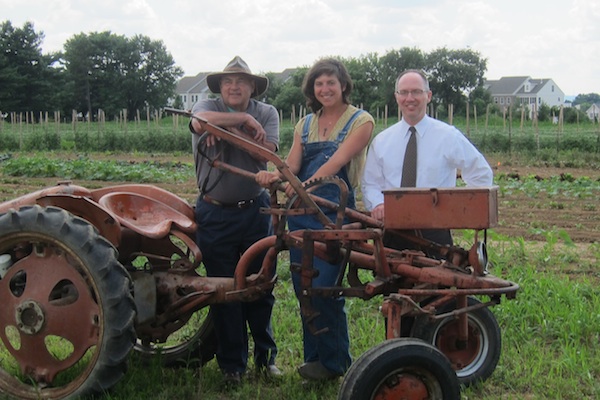A Partnership between Rodale Institute and St. Luke’s University Health Network
In 431 B.C. Hippocrates said, “Let food be thy medicine and medicine be thy food.”
Over 2500 years later, we are inundated with advertisements boasting the latest, greatest cure-all super drug. From a young age, we learn that it doesn’t matter how or what we eat, there is a quick fix around the corner for whatever ails us – whether we’re obese, have high blood pressure, or bad cholesterol – just to name a few of the issues plaguing our society.
It now seems almost revolutionary to think that we can change our health by changing the food we eat.
But, one hospital in Pennsylvania thought just that.
In 2014, Rodale Institute, in partnership with St. Luke’s University Health Network, launched a true farm to hospital food program.
The Anderson Campus at St. Luke’s has over 300 acres of farmland, much of which had historically been farmed conventionally with crops like corn and soy. The hospital administration recognized the impact that providing fresh, local organic produce could have on patient health and approached Rodale Institute to transition the land to organic and farm vegetables to be used in patient meals as well as in the cafeteria.
Lynn Trizna, or Farmer Lynn, as she’s known around St. Luke’s, provides food to all six hospitals within the Network. This year, she is growing five acres of vegetables with plans to expand to ten acres in coming years. She estimates about 44,000 lbs of produce from her farm will be served in the hospital, just this season. She is paid a salary through Rodale Institute and has employed three staff members, all aspiring farmers.
With a three-year plan in place, Rodale Institute and St. Luke’s see the potential for expansion. We envision growing the program to include fifteen to twenty farmers – supporting new farmers who don’t have access to land; greenhouses that allow for year round production of produce; and a small batch cannery, ensuring that we can enjoy the harvest, even in the coldest months of winter.
We have created this model with the belief that it can, and should, be replicated at every hospital throughout the United States.
So, the next time you’re feeling a bit under the weather, stop – think of us and Hippocrates’ words of wisdom. Maybe you’ll then look to the garden for a cure, instead of the medicine cabinet.
Visit St. Luke’s Rodale Organic Farm to learn more about this project.
Source: RodaleInstitute.org
Rodale Institute was founded in 1947 by organic pioneer J.I. Rodale to study the link between healthy soil, healthy food and healthy people. The Institute is committed to groundbreaking research in organic agriculture, advocating for policies that support farmers, and educating people about how organic is the safest, healthiest option for people and the planet.
